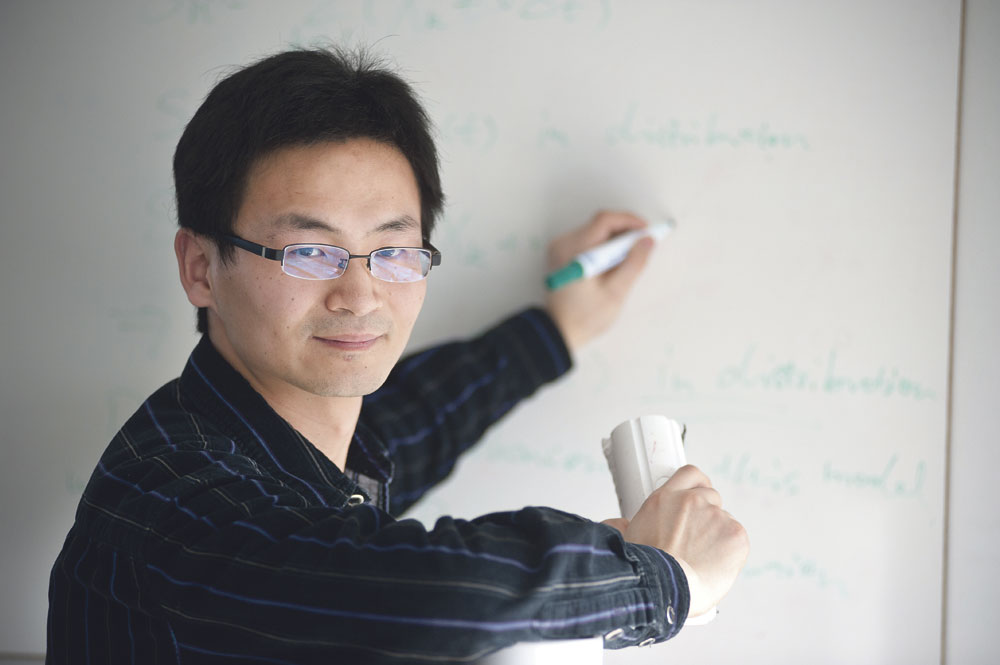Name: Derong Kong
Nationality: Chinese
Supervisor: Professor Michel Dekking
Subject: Fractals and moving plumes
Thesis defense: September 2012
“Pure mathematics is beautiful; it can arrange the world by using very simple equations.
Name: Derong Kong
Nationality: Chinese
Supervisor: Professor Michel Dekking
Subject: Fractals and moving plumes
Thesis defense: September 2012
“Pure mathematics is beautiful; it can arrange the world by using very simple equations.
You can just think of the simplicity of Einstein’s equation E=mc2. Mathematics can also produce sensational images, like pictures of fractals, which incredibly resemble the real world, for example clouds, coastlines, lightening or trees. In my MSc and now in my PhD, I wanted to pursue my fascination for mathematics but also really wanted to make useful mathematics.
Because my supervisor thought it was best for me not to become ‘too specialized’, my PhD, unlike most others, consists of two distinct research topics: a theoretical problem and a practical problem. The theoretical part of my research is related to non-linear dynamical systems, which are basically all around us, from the weather to the stock market and genetic distribution of population. Theories are still needed though to better understand and analyze these systems. The study of fractals can be useful in that respect, since fractals can be described as the geometric representation of chaos. In my research I work with Cantor sets, very simple fractals which can represent strange attractors, and these are attractors in chaotic systems. Since basic Cantor sets exemplify only a simplistic case of strange attractors, I tried to create a generalized form of Cantor sets or ‘homogeneous Cantor sets’ with so-called ‘beta-expansion’ mathematical techniques. Now, I’m looking at the intersection between two homogeneous cantor sets, in order to theorize a more complex structure for strange attractors.
The applied part of my PhD is linked to an existing civil engineering issue: moving plumes in ground water. A plume can be described as a mass of material, typically a pollutant, spreading from a source. When a plume penetrates ground water, advection and/or dispersion occur generally. For civil engineers to be able to tackle plume issues, they need to understand the behavior of plumes over time. Partial differential equations are usually used to calculate the plumes’ kinetic transport. However, these equations are typically extremely difficult to solve. Thus I am trying to facilitate this calculation by developing a stochastic model. Such a model estimates the probability distribution of potential outcomes based on a large number of repeated simulations and random variation in the input.
Basically, the only link between my two research topics is mathematical analysis. In fact, I enjoy this dual aspect of PhD, because it provides more diversity in my daily work. To me the most important in a PhD research is not to have a grand topic, but rather how to do research on your own. For instance, I learned that to solve a problem you have to understand knowledge at the periphery of your own knowledge. Plus, in mathematics research, rigor is a must.”
“The car just stopped itself!” Top Gear’s Jeremy Clarkson cries out during a test drive of a luxury car fitted with radar-guided cruise control, which means it dynamically follows the car in front. “It speeds up, we speed up. It slows down, we slow down,” Clarkson explains, but adds that it’s eerily scary not to touch a brake pedal when coming to a roundabout at the end of the motorway. Still, the car performs flawlessly. “All right, I can go now. No need for me anymore,” Clarkson concluded.
Such driving intelligence exist, it doesn’t cost the world (between 1,000 and 3,000 euros), and, according to Professor Bart van Arem (CEGS), it makes driving safer, while also significantly reducing congestion if more than 10 percent of all cars are equipped with Advanced Driver Assistance Systems (Adas). So what’s holding back the dawn of mobile intelligence?
In her PhD research, Dr Leonie Walta (TPM), identifies four parties involved: the automotive industry, public authorities, insurance companies and car users. She had representatives of each group fill in questionnaires on various deployment scenarios, and then she used these data to evaluate the outcomes of a stochastical model that explored the different scenarios.
Walta concluded that the initiative for introducing adaptive cruise controls will most likely (about 70 percent) come from the car industry. If offered as an option, one in six drivers will opt for it, she found. If government were to support this driving assistant with a tax reduction of 1,500 euros, one out of every two drivers would buy the Adas option.
Such tax reductions may seem the logical course to take while also being a much cheaper way of reducing traffic jams than by road building. But as long as only the luxury car brands offer the option, governments would end up subsidising Mercedes and Lexus buyers, which doesn’t look too good politically, Prof. van Arem says. A breakthrough could come from a driving assistant (which can take over the dull congestion driving) being offered in ordinary car brands, but at present all the industry’s buzz is about electric cars.
Leonie Walta, Getting Adas on the road, 21 April 2011, PhD supervisors Professor Karel Brookhuis and Professor Bart van Arem.
Top Gear on adaptive cruise control:
bit.ly/fb2uW0

Comments are closed.